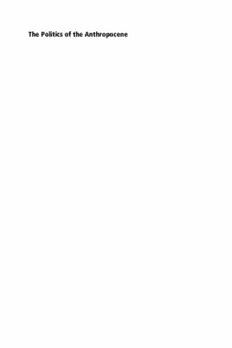
The Politics of the Anthropocene PDF
Preview The Politics of the Anthropocene
OUPCORRECTEDPROOF–FINAL,23/10/2018,SPi The Politics of the Anthropocene OUPCORRECTEDPROOF–FINAL,23/10/2018,SPi OUPCORRECTEDPROOF–FINAL,23/10/2018,SPi The Politics of the Anthropocene John S. Dryzek Jonathan Pickering 1 OUPCORRECTEDPROOF–FINAL,23/10/2018,SPi 3 GreatClarendonStreet,Oxford,OX26DP, UnitedKingdom OxfordUniversityPressisadepartmentoftheUniversityofOxford. ItfurtherstheUniversity’sobjectiveofexcellenceinresearch,scholarship, andeducationbypublishingworldwide.Oxfordisaregisteredtrademarkof OxfordUniversityPressintheUKandincertainothercountries ©JohnS.DryzekandJonathanPickering2019 Themoralrightsoftheauthorshavebeenasserted FirstEditionpublishedin2019 Impression:1 Allrightsreserved.Nopartofthispublicationmaybereproduced,storedin aretrievalsystem,ortransmitted,inanyformorbyanymeans,withoutthe priorpermissioninwritingofOxfordUniversityPress,orasexpresslypermitted bylaw,bylicenceorundertermsagreedwiththeappropriatereprographics rightsorganization.Enquiriesconcerningreproductionoutsidethescopeofthe aboveshouldbesenttotheRightsDepartment,OxfordUniversityPress,atthe addressabove Youmustnotcirculatethisworkinanyotherform andyoumustimposethissameconditiononanyacquirer PublishedintheUnitedStatesofAmericabyOxfordUniversityPress 198MadisonAvenue,NewYork,NY10016,UnitedStatesofAmerica BritishLibraryCataloguinginPublicationData Dataavailable LibraryofCongressControlNumber:2018950279 ISBN 978–0–19–880961–6(hbk) 978–0–19–880962–3(pbk) Printedandboundby CPIGroup(UK)Ltd,Croydon,CR04YY LinkstothirdpartywebsitesareprovidedbyOxfordingoodfaithand forinformationonly.Oxforddisclaimsanyresponsibilityforthematerials containedinanythirdpartywebsitereferencedinthiswork. OUPCORRECTEDPROOF–FINAL,23/10/2018,SPi ■ PREFACE TheAnthropoceneisanemergingepochofhuman-inducedinstabilityinthe Earth system. The challenge the Anthropocene presents to humanity is pro- found,meaningthatinfutureallpoliticsshouldbefirstandforemostapolitics oftheAnthropocene.Weareofcoursealongwayfromthathappening,asthe worldseemsstuckwithinstitutions,practices,andmodesofthinkingthatwere appropriate in the Holocene—the epoch of around 12,000 years of unusual stabilityintheEarthsystem,towardtheendofwhichmoderninstitutionssuch asstatesandcapitalistmarketsarose.Thepurposeofthisbookistomoveusa bitclosertomakingallpoliticsapoliticsoftheAnthropocene.Atissuearenot justparticularinstitutions,values,andpractices,buthowwethinkofamodern world in which we are no longer estranged from the processes of the Earth system,andinwhichsystemsoncecategorizedasnon-humancanbejoinedina moreproductiverelationship. OursisnotthefirstbookontheAnthropocene,orindeedonitsspecifically political implications. However, we offer here something that we believe earliertreatmentsmiss.Someofthemarestillabitstuckinmodesofthought, and menus of options, developed under Holocene conditions. Others are quick to rush to prescriptions without really coming to grips with the depth of the challenge. Others still have a sophisticated understanding of the Anthropocene that is not matched by a sophisticated understanding of how governancedoesandcanwork.Andyetothersdonottrulycometogripswith the dynamic conditions of the Anthropocene that render any institutional proposal unstable, no matter how attractive it might seem. We will try to do better.Wehavetriedtomakethetreatmentaccessible(andifthereareplaces where we have not altogether succeeded, that may be explained by the complexityoftheissueswearedealingwith). Preliminaryversionsofpartsofthisbookoritswholewerepresentedatthe Workshop“OntheScaleofWorlds:Technoscience andGlobal Governance” intheProgramonScience,TechnologyandSociety,HarvardUniversity,2014; theDemocracyFellowsSeminarintheAshCenter,HarvardUniversity,2014; the 2015 and 2017 annual conferences of the Earth System Governance Project, in Canberra and Lund respectively; the Arne Naess Symposium at the University of Oslo, 2016; the International Ethics Research Seminar organized by Toni Erskine in Canberra, 2017; the Ecological Democracy workshop held at the University of Sydney, 2017; the conference of the EuropeanInternationalStudiesAssociationinBarcelona,2017;theconference of the Australian Political Studies Association in Melbourne, 2017; the OUPCORRECTEDPROOF–FINAL,23/10/2018,SPi vi PREFACE Environmental Politics, Policy and Learning seminar in the Department of Political Science at Stockholm University, 2017; the Sydney Conference on EnvironmentalJusticeattheUniversityofSydney,2017;theAustralasianAid ConferenceattheAustralianNationalUniversity,2018;theconventionofthe International Studies Association in San Francisco, 2018; and in seminars of our own Centre for Deliberative Democracy and Global Governance at the UniversityofCanberra. Foradviceandcommentsondraftchaptersorprecursorpapers,wethank Karin Bäckstrand, Christian Barry, Robert Bartlett, Andrew Dobson, Chris- tian Downie, Sonya Duus, Victor Galaz, Peter Haas, Clive Hamilton, Marit Hammond,StephenHobden,SigridHohle,SheilaJasanoff,JonathanKuyper, Michael Mackenzie, James Meadowcroft, Richard Norgaard, Odin Lysaker, ÅsaPersson,StuartPickering,DominicRoser,DavidSchlosberg,WillSteffen, Hayley Stevenson, Dina Townsend, and Steve Vanderheiden. Annika Her- nandez helped with formatting figures. We would also like to thank all our colleagues in the Earth System Governance Project. Jonathan would like to thank John for his advice, inspiration and patience in what proved to be a highlyenjoyablecollaborationandanidealintroductiontothecraftofbook- writing. Jonathan would like to thank his family for their wonderful support andencouragementalongtheway.Theneedtowriteclearlyaboutchangesin the Earth system that will increasingly affect generations to come was never clearerthanwhenhavingtoexplaintheideaofAnthropocenetotwoprimary- school-agedboysoverbreakfast.Johnthankshisfamily(whichhesometimes forgets to do), and thanks Jonathan forthe pleasure of the co-authorship. This research was supported by Australian Research Council Laureate Fellowship FL140100154. Most of the work was done in the Centre for Deliberative Democracy and Global Governance in the Institute for Govern- anceandPolicyAnalysisattheUniversityofCanberra.Weareluckytohave such an excellent working environment, and such a fine group of colleagues and PhD students. Chapter5 benefited considerably from background research undertaken by Sonya Duus on the process of negotiating the Sus- tainableDevelopmentGoals.JohnDryzekdidsomeoftheearlyworkwhilehe wasaSeniorDemocracyFellowintheAshCenterforDemocraticGovernance andInnovationatHarvardUniversityin2014,andhethanksArchonFungfor beingagreathost. We have used most of the text from John S. Dryzek, “Institutions for the Anthropocene: Governance in a Changing Earth System,” British Journal of PoliticalScience46(4)(2016):937–56,mostlyinchapters2and3,thoughitis heavilymodified,reorganized,andoccasionallyredacted.Inchapter7wehave used a smaller amount of text from John S. Dryzek and Jonathan Pickering, “DeliberationasaCatalystforReflexiveEnvironmentalGovernance,”Ecological Economics131(2017):353–60. OUPCORRECTEDPROOF–FINAL,23/10/2018,SPi ■ LIST OF FIGURES 1.1 TheGreatAcceleration 4 1.2 Planetaryboundaries 7 3.1 Componentsofecologicalreflexivity 36 4.1 Dimensionsofplanetaryjustice 68 5.1 Reflexivesustainability 87 7.1 Theformativesphere 129 OUPCORRECTEDPROOF–FINAL,23/10/2018,SPi OUPCORRECTEDPROOF–FINAL,23/10/2018,SPi ■ ABBREVIATIONS CBD ConventiononBiologicalDiversity CBDR&RC commonbutdifferentiatedresponsibilitiesandrespectivecapabilities CCS carboncaptureandstorage(orcarboncaptureandsequestration) G20 Groupof20 HFCs hydrofluorocarbons ICLEI InternationalCouncilforLocalEnvironmentalInitiatives IPBES IntergovernmentalScience-PolicyPlatformonBiodiversityand EcosystemServices IPCC IntergovernmentalPanelonClimateChange IUCN InternationalUnionfortheConservationofNature MDGs MillenniumDevelopmentGoals NGO non-governmentorganization OECD OrganizationforEconomicCo-operationandDevelopment ppm partspermillion SDGs SustainableDevelopmentGoals UNFCCC UnitedNationsFrameworkConventiononClimateChange OUPCORRECTEDPROOF–FINAL,23/10/2018,SPi
